Great Divergence: Causes and Factors of Western Dominance Explored
VerifiedAdded on 2023/02/01
|14
|4316
|76
Essay
AI Summary
This essay delves into the complex debate of the Great Divergence, a term used to describe the shift in global power dynamics where the Western world gained dominance in the 19th century. It critically analyzes the arguments surrounding this phenomenon, exploring the roles of political fragmentation, economic advantages derived from colonialism, and cultural factors, including the influence of Protestantism. The essay examines how political competition in Europe, in contrast to the more centralized systems in Asia, fostered innovation and economic growth. It also assesses the impact of colonial expansion and access to resources, particularly the exploitation of the Americas. Furthermore, the essay investigates the cultural aspects, addressing Max Weber's theory linking Protestantism to capitalism and economic expansion. The analysis considers diverse perspectives, including those that challenge the notion of Western cultural superiority and highlights the complexities of global economic development during that period. The essay concludes by synthesizing these factors to provide a nuanced understanding of the Great Divergence, considering various arguments from different scholars.
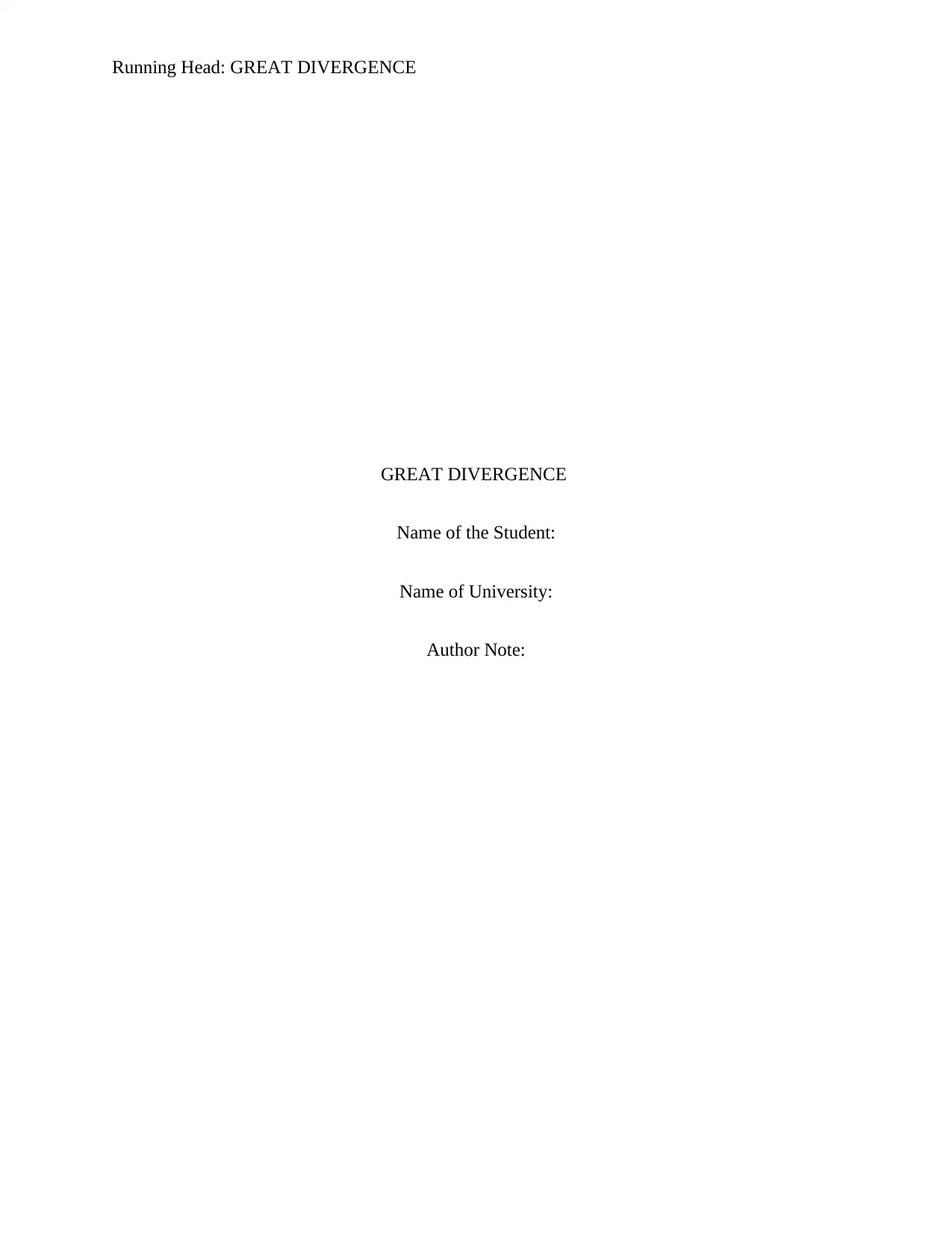
Running Head: GREAT DIVERGENCE
GREAT DIVERGENCE
Name of the Student:
Name of University:
Author Note:
GREAT DIVERGENCE
Name of the Student:
Name of University:
Author Note:
Paraphrase This Document
Need a fresh take? Get an instant paraphrase of this document with our AI Paraphraser
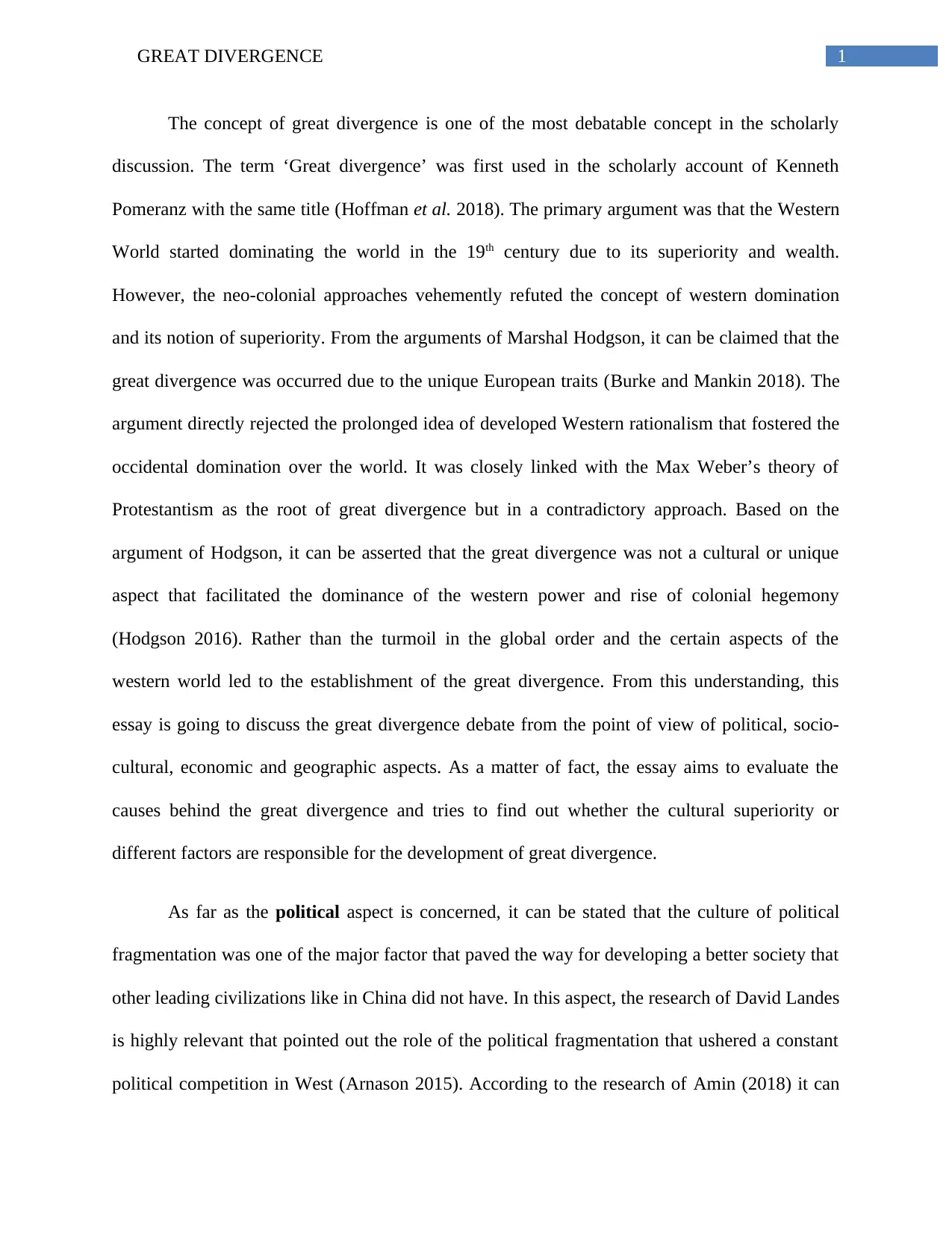
1GREAT DIVERGENCE
The concept of great divergence is one of the most debatable concept in the scholarly
discussion. The term ‘Great divergence’ was first used in the scholarly account of Kenneth
Pomeranz with the same title (Hoffman et al. 2018). The primary argument was that the Western
World started dominating the world in the 19th century due to its superiority and wealth.
However, the neo-colonial approaches vehemently refuted the concept of western domination
and its notion of superiority. From the arguments of Marshal Hodgson, it can be claimed that the
great divergence was occurred due to the unique European traits (Burke and Mankin 2018). The
argument directly rejected the prolonged idea of developed Western rationalism that fostered the
occidental domination over the world. It was closely linked with the Max Weber’s theory of
Protestantism as the root of great divergence but in a contradictory approach. Based on the
argument of Hodgson, it can be asserted that the great divergence was not a cultural or unique
aspect that facilitated the dominance of the western power and rise of colonial hegemony
(Hodgson 2016). Rather than the turmoil in the global order and the certain aspects of the
western world led to the establishment of the great divergence. From this understanding, this
essay is going to discuss the great divergence debate from the point of view of political, socio-
cultural, economic and geographic aspects. As a matter of fact, the essay aims to evaluate the
causes behind the great divergence and tries to find out whether the cultural superiority or
different factors are responsible for the development of great divergence.
As far as the political aspect is concerned, it can be stated that the culture of political
fragmentation was one of the major factor that paved the way for developing a better society that
other leading civilizations like in China did not have. In this aspect, the research of David Landes
is highly relevant that pointed out the role of the political fragmentation that ushered a constant
political competition in West (Arnason 2015). According to the research of Amin (2018) it can
The concept of great divergence is one of the most debatable concept in the scholarly
discussion. The term ‘Great divergence’ was first used in the scholarly account of Kenneth
Pomeranz with the same title (Hoffman et al. 2018). The primary argument was that the Western
World started dominating the world in the 19th century due to its superiority and wealth.
However, the neo-colonial approaches vehemently refuted the concept of western domination
and its notion of superiority. From the arguments of Marshal Hodgson, it can be claimed that the
great divergence was occurred due to the unique European traits (Burke and Mankin 2018). The
argument directly rejected the prolonged idea of developed Western rationalism that fostered the
occidental domination over the world. It was closely linked with the Max Weber’s theory of
Protestantism as the root of great divergence but in a contradictory approach. Based on the
argument of Hodgson, it can be asserted that the great divergence was not a cultural or unique
aspect that facilitated the dominance of the western power and rise of colonial hegemony
(Hodgson 2016). Rather than the turmoil in the global order and the certain aspects of the
western world led to the establishment of the great divergence. From this understanding, this
essay is going to discuss the great divergence debate from the point of view of political, socio-
cultural, economic and geographic aspects. As a matter of fact, the essay aims to evaluate the
causes behind the great divergence and tries to find out whether the cultural superiority or
different factors are responsible for the development of great divergence.
As far as the political aspect is concerned, it can be stated that the culture of political
fragmentation was one of the major factor that paved the way for developing a better society that
other leading civilizations like in China did not have. In this aspect, the research of David Landes
is highly relevant that pointed out the role of the political fragmentation that ushered a constant
political competition in West (Arnason 2015). According to the research of Amin (2018) it can
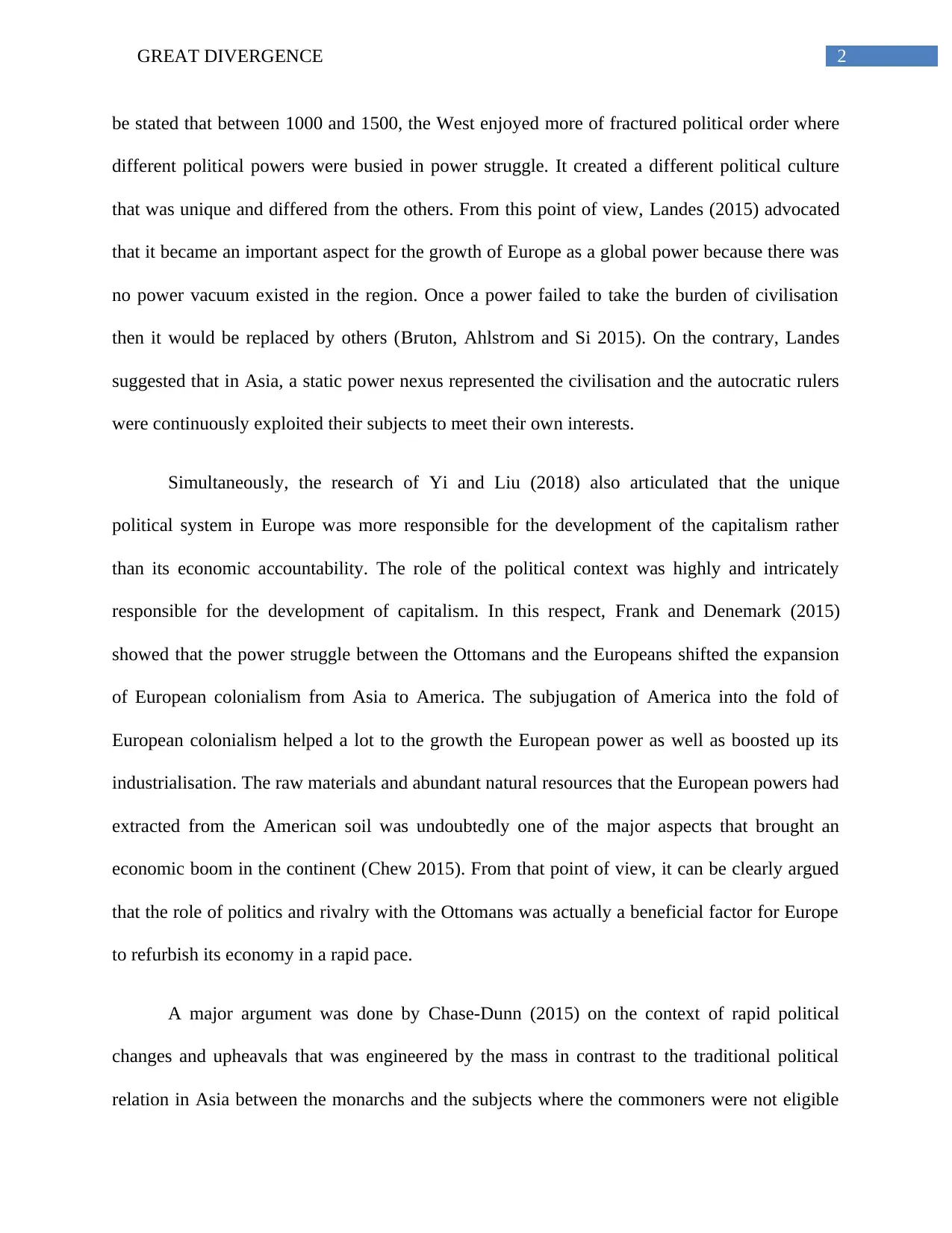
2GREAT DIVERGENCE
be stated that between 1000 and 1500, the West enjoyed more of fractured political order where
different political powers were busied in power struggle. It created a different political culture
that was unique and differed from the others. From this point of view, Landes (2015) advocated
that it became an important aspect for the growth of Europe as a global power because there was
no power vacuum existed in the region. Once a power failed to take the burden of civilisation
then it would be replaced by others (Bruton, Ahlstrom and Si 2015). On the contrary, Landes
suggested that in Asia, a static power nexus represented the civilisation and the autocratic rulers
were continuously exploited their subjects to meet their own interests.
Simultaneously, the research of Yi and Liu (2018) also articulated that the unique
political system in Europe was more responsible for the development of the capitalism rather
than its economic accountability. The role of the political context was highly and intricately
responsible for the development of capitalism. In this respect, Frank and Denemark (2015)
showed that the power struggle between the Ottomans and the Europeans shifted the expansion
of European colonialism from Asia to America. The subjugation of America into the fold of
European colonialism helped a lot to the growth the European power as well as boosted up its
industrialisation. The raw materials and abundant natural resources that the European powers had
extracted from the American soil was undoubtedly one of the major aspects that brought an
economic boom in the continent (Chew 2015). From that point of view, it can be clearly argued
that the role of politics and rivalry with the Ottomans was actually a beneficial factor for Europe
to refurbish its economy in a rapid pace.
A major argument was done by Chase-Dunn (2015) on the context of rapid political
changes and upheavals that was engineered by the mass in contrast to the traditional political
relation in Asia between the monarchs and the subjects where the commoners were not eligible
be stated that between 1000 and 1500, the West enjoyed more of fractured political order where
different political powers were busied in power struggle. It created a different political culture
that was unique and differed from the others. From this point of view, Landes (2015) advocated
that it became an important aspect for the growth of Europe as a global power because there was
no power vacuum existed in the region. Once a power failed to take the burden of civilisation
then it would be replaced by others (Bruton, Ahlstrom and Si 2015). On the contrary, Landes
suggested that in Asia, a static power nexus represented the civilisation and the autocratic rulers
were continuously exploited their subjects to meet their own interests.
Simultaneously, the research of Yi and Liu (2018) also articulated that the unique
political system in Europe was more responsible for the development of the capitalism rather
than its economic accountability. The role of the political context was highly and intricately
responsible for the development of capitalism. In this respect, Frank and Denemark (2015)
showed that the power struggle between the Ottomans and the Europeans shifted the expansion
of European colonialism from Asia to America. The subjugation of America into the fold of
European colonialism helped a lot to the growth the European power as well as boosted up its
industrialisation. The raw materials and abundant natural resources that the European powers had
extracted from the American soil was undoubtedly one of the major aspects that brought an
economic boom in the continent (Chew 2015). From that point of view, it can be clearly argued
that the role of politics and rivalry with the Ottomans was actually a beneficial factor for Europe
to refurbish its economy in a rapid pace.
A major argument was done by Chase-Dunn (2015) on the context of rapid political
changes and upheavals that was engineered by the mass in contrast to the traditional political
relation in Asia between the monarchs and the subjects where the commoners were not eligible
⊘ This is a preview!⊘
Do you want full access?
Subscribe today to unlock all pages.

Trusted by 1+ million students worldwide
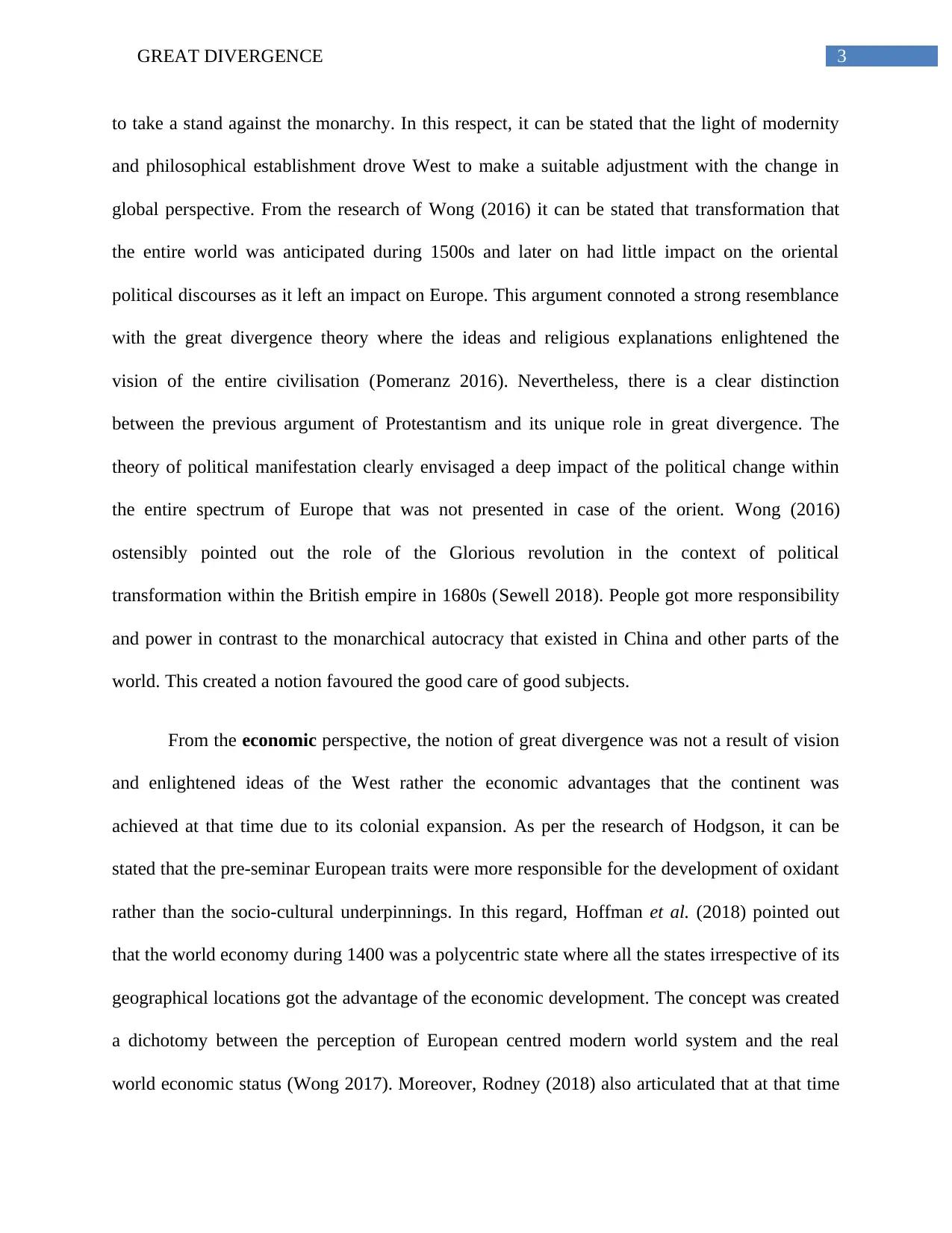
3GREAT DIVERGENCE
to take a stand against the monarchy. In this respect, it can be stated that the light of modernity
and philosophical establishment drove West to make a suitable adjustment with the change in
global perspective. From the research of Wong (2016) it can be stated that transformation that
the entire world was anticipated during 1500s and later on had little impact on the oriental
political discourses as it left an impact on Europe. This argument connoted a strong resemblance
with the great divergence theory where the ideas and religious explanations enlightened the
vision of the entire civilisation (Pomeranz 2016). Nevertheless, there is a clear distinction
between the previous argument of Protestantism and its unique role in great divergence. The
theory of political manifestation clearly envisaged a deep impact of the political change within
the entire spectrum of Europe that was not presented in case of the orient. Wong (2016)
ostensibly pointed out the role of the Glorious revolution in the context of political
transformation within the British empire in 1680s (Sewell 2018). People got more responsibility
and power in contrast to the monarchical autocracy that existed in China and other parts of the
world. This created a notion favoured the good care of good subjects.
From the economic perspective, the notion of great divergence was not a result of vision
and enlightened ideas of the West rather the economic advantages that the continent was
achieved at that time due to its colonial expansion. As per the research of Hodgson, it can be
stated that the pre-seminar European traits were more responsible for the development of oxidant
rather than the socio-cultural underpinnings. In this regard, Hoffman et al. (2018) pointed out
that the world economy during 1400 was a polycentric state where all the states irrespective of its
geographical locations got the advantage of the economic development. The concept was created
a dichotomy between the perception of European centred modern world system and the real
world economic status (Wong 2017). Moreover, Rodney (2018) also articulated that at that time
to take a stand against the monarchy. In this respect, it can be stated that the light of modernity
and philosophical establishment drove West to make a suitable adjustment with the change in
global perspective. From the research of Wong (2016) it can be stated that transformation that
the entire world was anticipated during 1500s and later on had little impact on the oriental
political discourses as it left an impact on Europe. This argument connoted a strong resemblance
with the great divergence theory where the ideas and religious explanations enlightened the
vision of the entire civilisation (Pomeranz 2016). Nevertheless, there is a clear distinction
between the previous argument of Protestantism and its unique role in great divergence. The
theory of political manifestation clearly envisaged a deep impact of the political change within
the entire spectrum of Europe that was not presented in case of the orient. Wong (2016)
ostensibly pointed out the role of the Glorious revolution in the context of political
transformation within the British empire in 1680s (Sewell 2018). People got more responsibility
and power in contrast to the monarchical autocracy that existed in China and other parts of the
world. This created a notion favoured the good care of good subjects.
From the economic perspective, the notion of great divergence was not a result of vision
and enlightened ideas of the West rather the economic advantages that the continent was
achieved at that time due to its colonial expansion. As per the research of Hodgson, it can be
stated that the pre-seminar European traits were more responsible for the development of oxidant
rather than the socio-cultural underpinnings. In this regard, Hoffman et al. (2018) pointed out
that the world economy during 1400 was a polycentric state where all the states irrespective of its
geographical locations got the advantage of the economic development. The concept was created
a dichotomy between the perception of European centred modern world system and the real
world economic status (Wong 2017). Moreover, Rodney (2018) also articulated that at that time
Paraphrase This Document
Need a fresh take? Get an instant paraphrase of this document with our AI Paraphraser
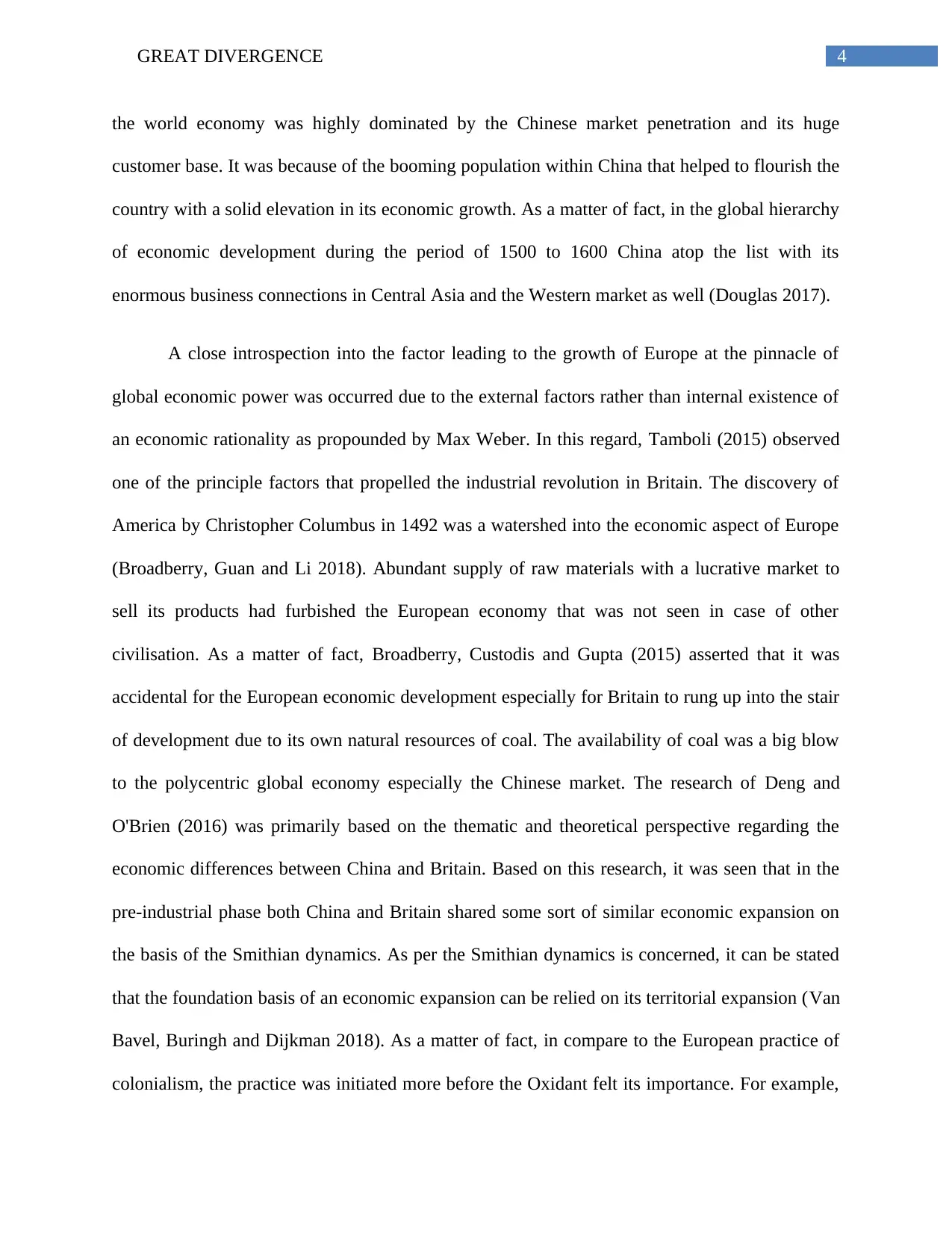
4GREAT DIVERGENCE
the world economy was highly dominated by the Chinese market penetration and its huge
customer base. It was because of the booming population within China that helped to flourish the
country with a solid elevation in its economic growth. As a matter of fact, in the global hierarchy
of economic development during the period of 1500 to 1600 China atop the list with its
enormous business connections in Central Asia and the Western market as well (Douglas 2017).
A close introspection into the factor leading to the growth of Europe at the pinnacle of
global economic power was occurred due to the external factors rather than internal existence of
an economic rationality as propounded by Max Weber. In this regard, Tamboli (2015) observed
one of the principle factors that propelled the industrial revolution in Britain. The discovery of
America by Christopher Columbus in 1492 was a watershed into the economic aspect of Europe
(Broadberry, Guan and Li 2018). Abundant supply of raw materials with a lucrative market to
sell its products had furbished the European economy that was not seen in case of other
civilisation. As a matter of fact, Broadberry, Custodis and Gupta (2015) asserted that it was
accidental for the European economic development especially for Britain to rung up into the stair
of development due to its own natural resources of coal. The availability of coal was a big blow
to the polycentric global economy especially the Chinese market. The research of Deng and
O'Brien (2016) was primarily based on the thematic and theoretical perspective regarding the
economic differences between China and Britain. Based on this research, it was seen that in the
pre-industrial phase both China and Britain shared some sort of similar economic expansion on
the basis of the Smithian dynamics. As per the Smithian dynamics is concerned, it can be stated
that the foundation basis of an economic expansion can be relied on its territorial expansion (Van
Bavel, Buringh and Dijkman 2018). As a matter of fact, in compare to the European practice of
colonialism, the practice was initiated more before the Oxidant felt its importance. For example,
the world economy was highly dominated by the Chinese market penetration and its huge
customer base. It was because of the booming population within China that helped to flourish the
country with a solid elevation in its economic growth. As a matter of fact, in the global hierarchy
of economic development during the period of 1500 to 1600 China atop the list with its
enormous business connections in Central Asia and the Western market as well (Douglas 2017).
A close introspection into the factor leading to the growth of Europe at the pinnacle of
global economic power was occurred due to the external factors rather than internal existence of
an economic rationality as propounded by Max Weber. In this regard, Tamboli (2015) observed
one of the principle factors that propelled the industrial revolution in Britain. The discovery of
America by Christopher Columbus in 1492 was a watershed into the economic aspect of Europe
(Broadberry, Guan and Li 2018). Abundant supply of raw materials with a lucrative market to
sell its products had furbished the European economy that was not seen in case of other
civilisation. As a matter of fact, Broadberry, Custodis and Gupta (2015) asserted that it was
accidental for the European economic development especially for Britain to rung up into the stair
of development due to its own natural resources of coal. The availability of coal was a big blow
to the polycentric global economy especially the Chinese market. The research of Deng and
O'Brien (2016) was primarily based on the thematic and theoretical perspective regarding the
economic differences between China and Britain. Based on this research, it was seen that in the
pre-industrial phase both China and Britain shared some sort of similar economic expansion on
the basis of the Smithian dynamics. As per the Smithian dynamics is concerned, it can be stated
that the foundation basis of an economic expansion can be relied on its territorial expansion (Van
Bavel, Buringh and Dijkman 2018). As a matter of fact, in compare to the European practice of
colonialism, the practice was initiated more before the Oxidant felt its importance. For example,
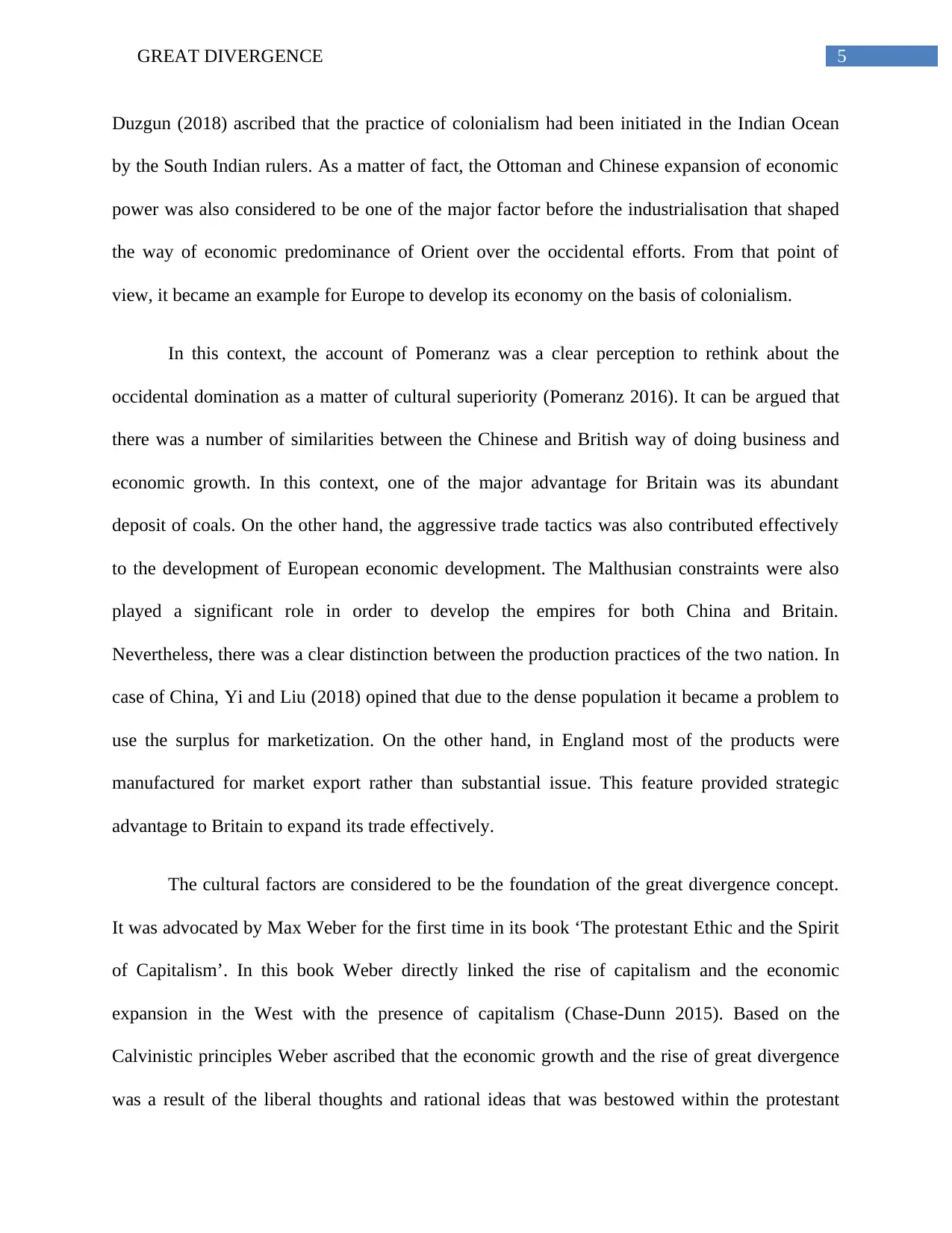
5GREAT DIVERGENCE
Duzgun (2018) ascribed that the practice of colonialism had been initiated in the Indian Ocean
by the South Indian rulers. As a matter of fact, the Ottoman and Chinese expansion of economic
power was also considered to be one of the major factor before the industrialisation that shaped
the way of economic predominance of Orient over the occidental efforts. From that point of
view, it became an example for Europe to develop its economy on the basis of colonialism.
In this context, the account of Pomeranz was a clear perception to rethink about the
occidental domination as a matter of cultural superiority (Pomeranz 2016). It can be argued that
there was a number of similarities between the Chinese and British way of doing business and
economic growth. In this context, one of the major advantage for Britain was its abundant
deposit of coals. On the other hand, the aggressive trade tactics was also contributed effectively
to the development of European economic development. The Malthusian constraints were also
played a significant role in order to develop the empires for both China and Britain.
Nevertheless, there was a clear distinction between the production practices of the two nation. In
case of China, Yi and Liu (2018) opined that due to the dense population it became a problem to
use the surplus for marketization. On the other hand, in England most of the products were
manufactured for market export rather than substantial issue. This feature provided strategic
advantage to Britain to expand its trade effectively.
The cultural factors are considered to be the foundation of the great divergence concept.
It was advocated by Max Weber for the first time in its book ‘The protestant Ethic and the Spirit
of Capitalism’. In this book Weber directly linked the rise of capitalism and the economic
expansion in the West with the presence of capitalism (Chase-Dunn 2015). Based on the
Calvinistic principles Weber ascribed that the economic growth and the rise of great divergence
was a result of the liberal thoughts and rational ideas that was bestowed within the protestant
Duzgun (2018) ascribed that the practice of colonialism had been initiated in the Indian Ocean
by the South Indian rulers. As a matter of fact, the Ottoman and Chinese expansion of economic
power was also considered to be one of the major factor before the industrialisation that shaped
the way of economic predominance of Orient over the occidental efforts. From that point of
view, it became an example for Europe to develop its economy on the basis of colonialism.
In this context, the account of Pomeranz was a clear perception to rethink about the
occidental domination as a matter of cultural superiority (Pomeranz 2016). It can be argued that
there was a number of similarities between the Chinese and British way of doing business and
economic growth. In this context, one of the major advantage for Britain was its abundant
deposit of coals. On the other hand, the aggressive trade tactics was also contributed effectively
to the development of European economic development. The Malthusian constraints were also
played a significant role in order to develop the empires for both China and Britain.
Nevertheless, there was a clear distinction between the production practices of the two nation. In
case of China, Yi and Liu (2018) opined that due to the dense population it became a problem to
use the surplus for marketization. On the other hand, in England most of the products were
manufactured for market export rather than substantial issue. This feature provided strategic
advantage to Britain to expand its trade effectively.
The cultural factors are considered to be the foundation of the great divergence concept.
It was advocated by Max Weber for the first time in its book ‘The protestant Ethic and the Spirit
of Capitalism’. In this book Weber directly linked the rise of capitalism and the economic
expansion in the West with the presence of capitalism (Chase-Dunn 2015). Based on the
Calvinistic principles Weber ascribed that the economic growth and the rise of great divergence
was a result of the liberal thoughts and rational ideas that was bestowed within the protestant
⊘ This is a preview!⊘
Do you want full access?
Subscribe today to unlock all pages.

Trusted by 1+ million students worldwide
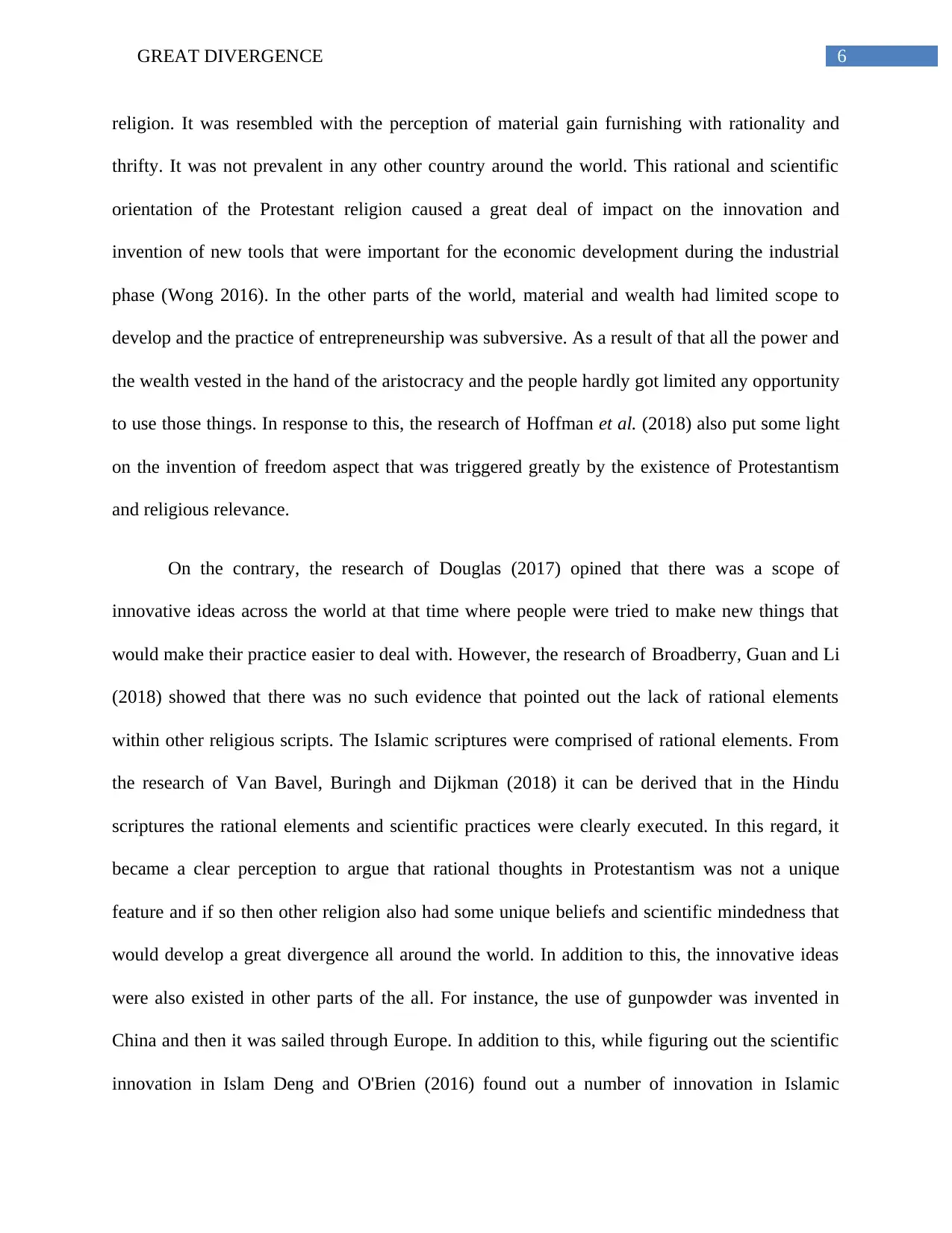
6GREAT DIVERGENCE
religion. It was resembled with the perception of material gain furnishing with rationality and
thrifty. It was not prevalent in any other country around the world. This rational and scientific
orientation of the Protestant religion caused a great deal of impact on the innovation and
invention of new tools that were important for the economic development during the industrial
phase (Wong 2016). In the other parts of the world, material and wealth had limited scope to
develop and the practice of entrepreneurship was subversive. As a result of that all the power and
the wealth vested in the hand of the aristocracy and the people hardly got limited any opportunity
to use those things. In response to this, the research of Hoffman et al. (2018) also put some light
on the invention of freedom aspect that was triggered greatly by the existence of Protestantism
and religious relevance.
On the contrary, the research of Douglas (2017) opined that there was a scope of
innovative ideas across the world at that time where people were tried to make new things that
would make their practice easier to deal with. However, the research of Broadberry, Guan and Li
(2018) showed that there was no such evidence that pointed out the lack of rational elements
within other religious scripts. The Islamic scriptures were comprised of rational elements. From
the research of Van Bavel, Buringh and Dijkman (2018) it can be derived that in the Hindu
scriptures the rational elements and scientific practices were clearly executed. In this regard, it
became a clear perception to argue that rational thoughts in Protestantism was not a unique
feature and if so then other religion also had some unique beliefs and scientific mindedness that
would develop a great divergence all around the world. In addition to this, the innovative ideas
were also existed in other parts of the all. For instance, the use of gunpowder was invented in
China and then it was sailed through Europe. In addition to this, while figuring out the scientific
innovation in Islam Deng and O'Brien (2016) found out a number of innovation in Islamic
religion. It was resembled with the perception of material gain furnishing with rationality and
thrifty. It was not prevalent in any other country around the world. This rational and scientific
orientation of the Protestant religion caused a great deal of impact on the innovation and
invention of new tools that were important for the economic development during the industrial
phase (Wong 2016). In the other parts of the world, material and wealth had limited scope to
develop and the practice of entrepreneurship was subversive. As a result of that all the power and
the wealth vested in the hand of the aristocracy and the people hardly got limited any opportunity
to use those things. In response to this, the research of Hoffman et al. (2018) also put some light
on the invention of freedom aspect that was triggered greatly by the existence of Protestantism
and religious relevance.
On the contrary, the research of Douglas (2017) opined that there was a scope of
innovative ideas across the world at that time where people were tried to make new things that
would make their practice easier to deal with. However, the research of Broadberry, Guan and Li
(2018) showed that there was no such evidence that pointed out the lack of rational elements
within other religious scripts. The Islamic scriptures were comprised of rational elements. From
the research of Van Bavel, Buringh and Dijkman (2018) it can be derived that in the Hindu
scriptures the rational elements and scientific practices were clearly executed. In this regard, it
became a clear perception to argue that rational thoughts in Protestantism was not a unique
feature and if so then other religion also had some unique beliefs and scientific mindedness that
would develop a great divergence all around the world. In addition to this, the innovative ideas
were also existed in other parts of the all. For instance, the use of gunpowder was invented in
China and then it was sailed through Europe. In addition to this, while figuring out the scientific
innovation in Islam Deng and O'Brien (2016) found out a number of innovation in Islamic
Paraphrase This Document
Need a fresh take? Get an instant paraphrase of this document with our AI Paraphraser
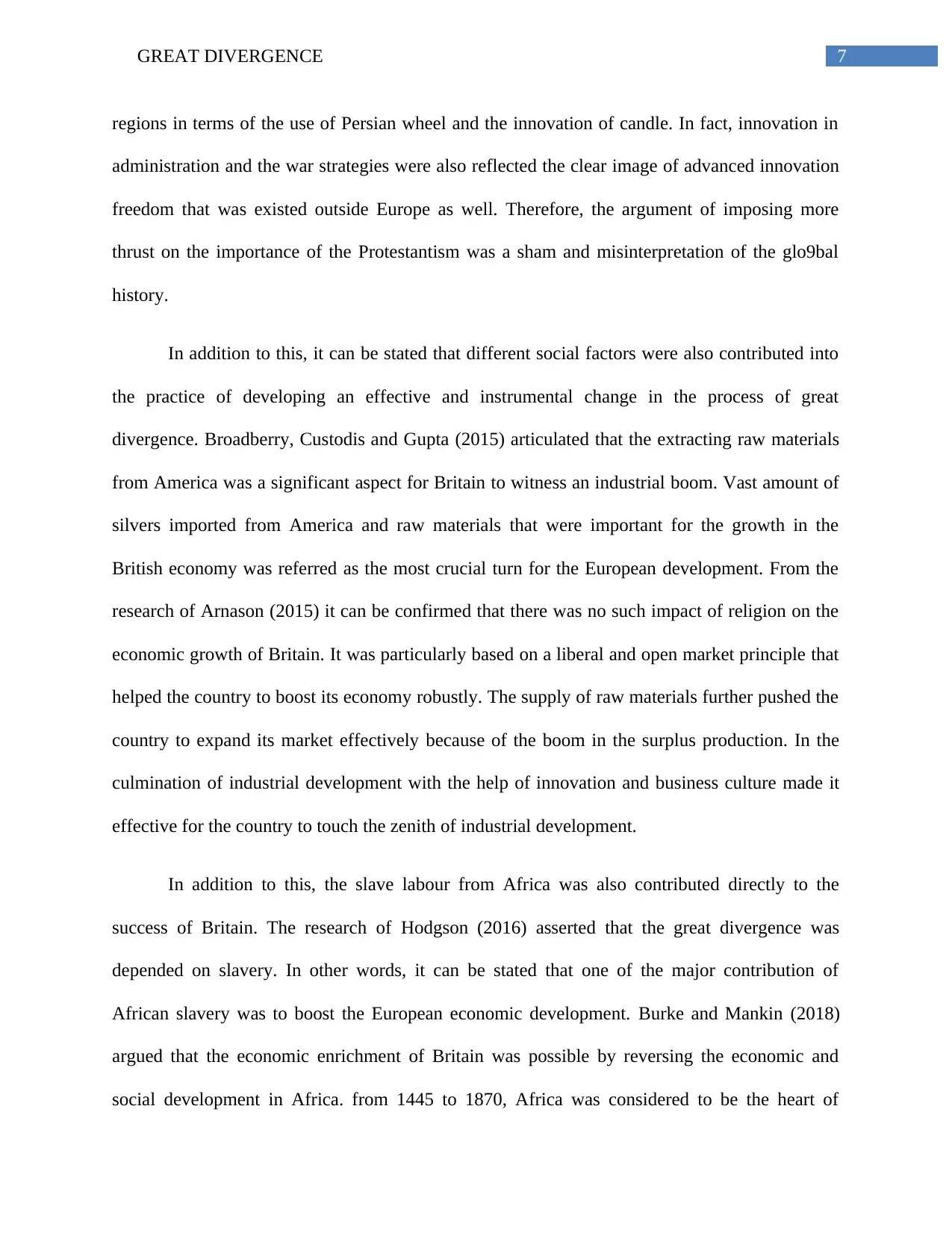
7GREAT DIVERGENCE
regions in terms of the use of Persian wheel and the innovation of candle. In fact, innovation in
administration and the war strategies were also reflected the clear image of advanced innovation
freedom that was existed outside Europe as well. Therefore, the argument of imposing more
thrust on the importance of the Protestantism was a sham and misinterpretation of the glo9bal
history.
In addition to this, it can be stated that different social factors were also contributed into
the practice of developing an effective and instrumental change in the process of great
divergence. Broadberry, Custodis and Gupta (2015) articulated that the extracting raw materials
from America was a significant aspect for Britain to witness an industrial boom. Vast amount of
silvers imported from America and raw materials that were important for the growth in the
British economy was referred as the most crucial turn for the European development. From the
research of Arnason (2015) it can be confirmed that there was no such impact of religion on the
economic growth of Britain. It was particularly based on a liberal and open market principle that
helped the country to boost its economy robustly. The supply of raw materials further pushed the
country to expand its market effectively because of the boom in the surplus production. In the
culmination of industrial development with the help of innovation and business culture made it
effective for the country to touch the zenith of industrial development.
In addition to this, the slave labour from Africa was also contributed directly to the
success of Britain. The research of Hodgson (2016) asserted that the great divergence was
depended on slavery. In other words, it can be stated that one of the major contribution of
African slavery was to boost the European economic development. Burke and Mankin (2018)
argued that the economic enrichment of Britain was possible by reversing the economic and
social development in Africa. from 1445 to 1870, Africa was considered to be the heart of
regions in terms of the use of Persian wheel and the innovation of candle. In fact, innovation in
administration and the war strategies were also reflected the clear image of advanced innovation
freedom that was existed outside Europe as well. Therefore, the argument of imposing more
thrust on the importance of the Protestantism was a sham and misinterpretation of the glo9bal
history.
In addition to this, it can be stated that different social factors were also contributed into
the practice of developing an effective and instrumental change in the process of great
divergence. Broadberry, Custodis and Gupta (2015) articulated that the extracting raw materials
from America was a significant aspect for Britain to witness an industrial boom. Vast amount of
silvers imported from America and raw materials that were important for the growth in the
British economy was referred as the most crucial turn for the European development. From the
research of Arnason (2015) it can be confirmed that there was no such impact of religion on the
economic growth of Britain. It was particularly based on a liberal and open market principle that
helped the country to boost its economy robustly. The supply of raw materials further pushed the
country to expand its market effectively because of the boom in the surplus production. In the
culmination of industrial development with the help of innovation and business culture made it
effective for the country to touch the zenith of industrial development.
In addition to this, the slave labour from Africa was also contributed directly to the
success of Britain. The research of Hodgson (2016) asserted that the great divergence was
depended on slavery. In other words, it can be stated that one of the major contribution of
African slavery was to boost the European economic development. Burke and Mankin (2018)
argued that the economic enrichment of Britain was possible by reversing the economic and
social development in Africa. from 1445 to 1870, Africa was considered to be the heart of
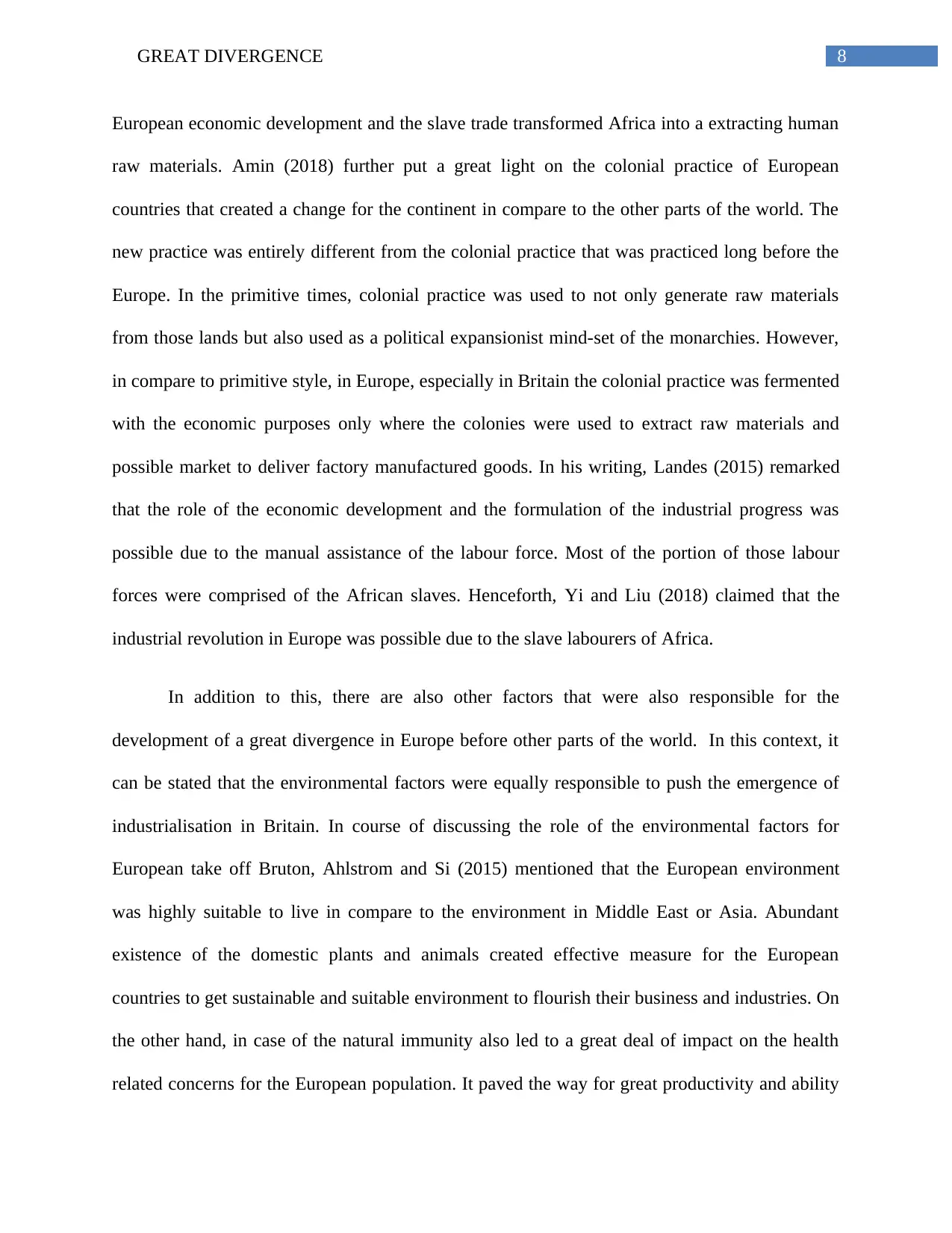
8GREAT DIVERGENCE
European economic development and the slave trade transformed Africa into a extracting human
raw materials. Amin (2018) further put a great light on the colonial practice of European
countries that created a change for the continent in compare to the other parts of the world. The
new practice was entirely different from the colonial practice that was practiced long before the
Europe. In the primitive times, colonial practice was used to not only generate raw materials
from those lands but also used as a political expansionist mind-set of the monarchies. However,
in compare to primitive style, in Europe, especially in Britain the colonial practice was fermented
with the economic purposes only where the colonies were used to extract raw materials and
possible market to deliver factory manufactured goods. In his writing, Landes (2015) remarked
that the role of the economic development and the formulation of the industrial progress was
possible due to the manual assistance of the labour force. Most of the portion of those labour
forces were comprised of the African slaves. Henceforth, Yi and Liu (2018) claimed that the
industrial revolution in Europe was possible due to the slave labourers of Africa.
In addition to this, there are also other factors that were also responsible for the
development of a great divergence in Europe before other parts of the world. In this context, it
can be stated that the environmental factors were equally responsible to push the emergence of
industrialisation in Britain. In course of discussing the role of the environmental factors for
European take off Bruton, Ahlstrom and Si (2015) mentioned that the European environment
was highly suitable to live in compare to the environment in Middle East or Asia. Abundant
existence of the domestic plants and animals created effective measure for the European
countries to get sustainable and suitable environment to flourish their business and industries. On
the other hand, in case of the natural immunity also led to a great deal of impact on the health
related concerns for the European population. It paved the way for great productivity and ability
European economic development and the slave trade transformed Africa into a extracting human
raw materials. Amin (2018) further put a great light on the colonial practice of European
countries that created a change for the continent in compare to the other parts of the world. The
new practice was entirely different from the colonial practice that was practiced long before the
Europe. In the primitive times, colonial practice was used to not only generate raw materials
from those lands but also used as a political expansionist mind-set of the monarchies. However,
in compare to primitive style, in Europe, especially in Britain the colonial practice was fermented
with the economic purposes only where the colonies were used to extract raw materials and
possible market to deliver factory manufactured goods. In his writing, Landes (2015) remarked
that the role of the economic development and the formulation of the industrial progress was
possible due to the manual assistance of the labour force. Most of the portion of those labour
forces were comprised of the African slaves. Henceforth, Yi and Liu (2018) claimed that the
industrial revolution in Europe was possible due to the slave labourers of Africa.
In addition to this, there are also other factors that were also responsible for the
development of a great divergence in Europe before other parts of the world. In this context, it
can be stated that the environmental factors were equally responsible to push the emergence of
industrialisation in Britain. In course of discussing the role of the environmental factors for
European take off Bruton, Ahlstrom and Si (2015) mentioned that the European environment
was highly suitable to live in compare to the environment in Middle East or Asia. Abundant
existence of the domestic plants and animals created effective measure for the European
countries to get sustainable and suitable environment to flourish their business and industries. On
the other hand, in case of the natural immunity also led to a great deal of impact on the health
related concerns for the European population. It paved the way for great productivity and ability
⊘ This is a preview!⊘
Do you want full access?
Subscribe today to unlock all pages.

Trusted by 1+ million students worldwide
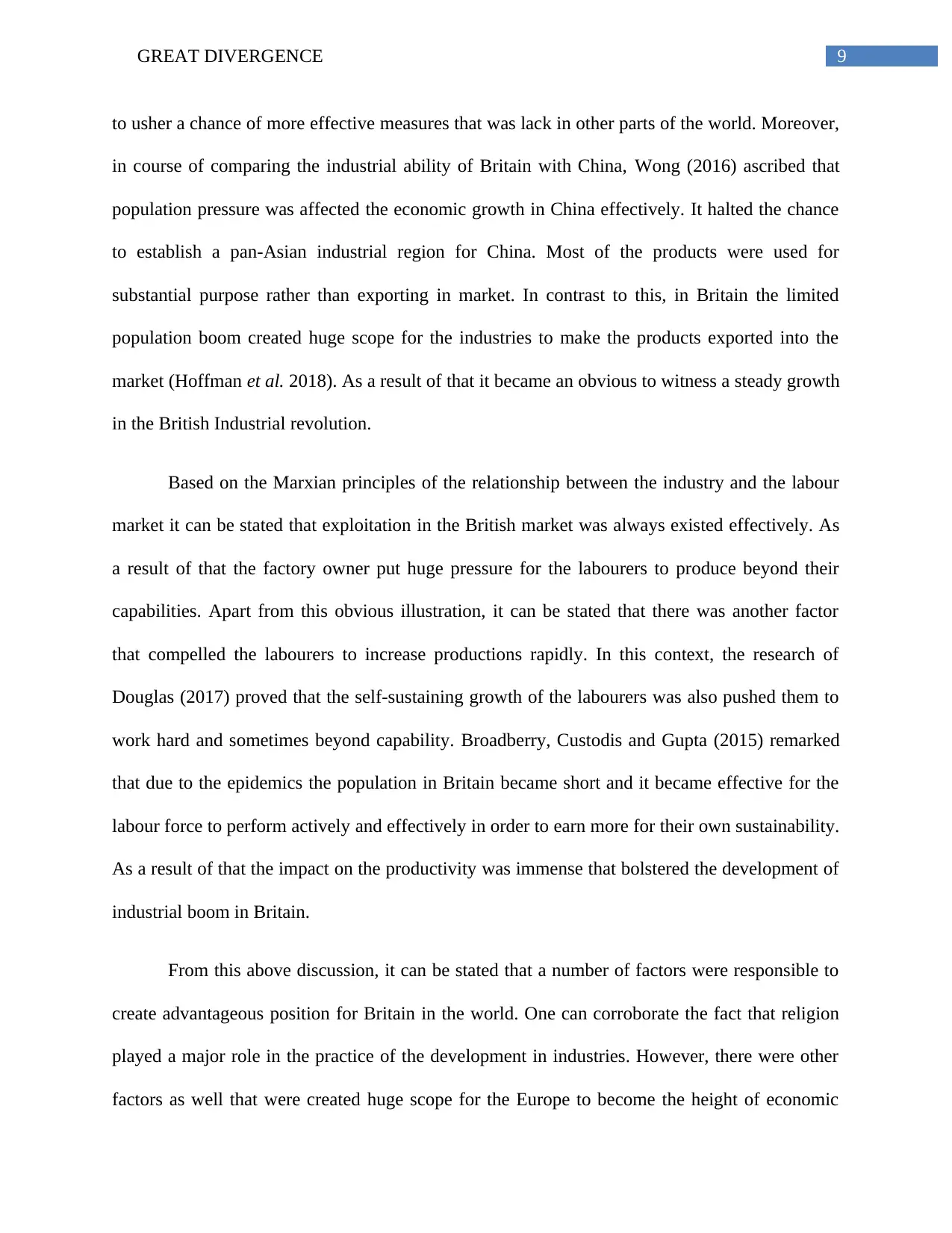
9GREAT DIVERGENCE
to usher a chance of more effective measures that was lack in other parts of the world. Moreover,
in course of comparing the industrial ability of Britain with China, Wong (2016) ascribed that
population pressure was affected the economic growth in China effectively. It halted the chance
to establish a pan-Asian industrial region for China. Most of the products were used for
substantial purpose rather than exporting in market. In contrast to this, in Britain the limited
population boom created huge scope for the industries to make the products exported into the
market (Hoffman et al. 2018). As a result of that it became an obvious to witness a steady growth
in the British Industrial revolution.
Based on the Marxian principles of the relationship between the industry and the labour
market it can be stated that exploitation in the British market was always existed effectively. As
a result of that the factory owner put huge pressure for the labourers to produce beyond their
capabilities. Apart from this obvious illustration, it can be stated that there was another factor
that compelled the labourers to increase productions rapidly. In this context, the research of
Douglas (2017) proved that the self-sustaining growth of the labourers was also pushed them to
work hard and sometimes beyond capability. Broadberry, Custodis and Gupta (2015) remarked
that due to the epidemics the population in Britain became short and it became effective for the
labour force to perform actively and effectively in order to earn more for their own sustainability.
As a result of that the impact on the productivity was immense that bolstered the development of
industrial boom in Britain.
From this above discussion, it can be stated that a number of factors were responsible to
create advantageous position for Britain in the world. One can corroborate the fact that religion
played a major role in the practice of the development in industries. However, there were other
factors as well that were created huge scope for the Europe to become the height of economic
to usher a chance of more effective measures that was lack in other parts of the world. Moreover,
in course of comparing the industrial ability of Britain with China, Wong (2016) ascribed that
population pressure was affected the economic growth in China effectively. It halted the chance
to establish a pan-Asian industrial region for China. Most of the products were used for
substantial purpose rather than exporting in market. In contrast to this, in Britain the limited
population boom created huge scope for the industries to make the products exported into the
market (Hoffman et al. 2018). As a result of that it became an obvious to witness a steady growth
in the British Industrial revolution.
Based on the Marxian principles of the relationship between the industry and the labour
market it can be stated that exploitation in the British market was always existed effectively. As
a result of that the factory owner put huge pressure for the labourers to produce beyond their
capabilities. Apart from this obvious illustration, it can be stated that there was another factor
that compelled the labourers to increase productions rapidly. In this context, the research of
Douglas (2017) proved that the self-sustaining growth of the labourers was also pushed them to
work hard and sometimes beyond capability. Broadberry, Custodis and Gupta (2015) remarked
that due to the epidemics the population in Britain became short and it became effective for the
labour force to perform actively and effectively in order to earn more for their own sustainability.
As a result of that the impact on the productivity was immense that bolstered the development of
industrial boom in Britain.
From this above discussion, it can be stated that a number of factors were responsible to
create advantageous position for Britain in the world. One can corroborate the fact that religion
played a major role in the practice of the development in industries. However, there were other
factors as well that were created huge scope for the Europe to become the height of economic
Paraphrase This Document
Need a fresh take? Get an instant paraphrase of this document with our AI Paraphraser
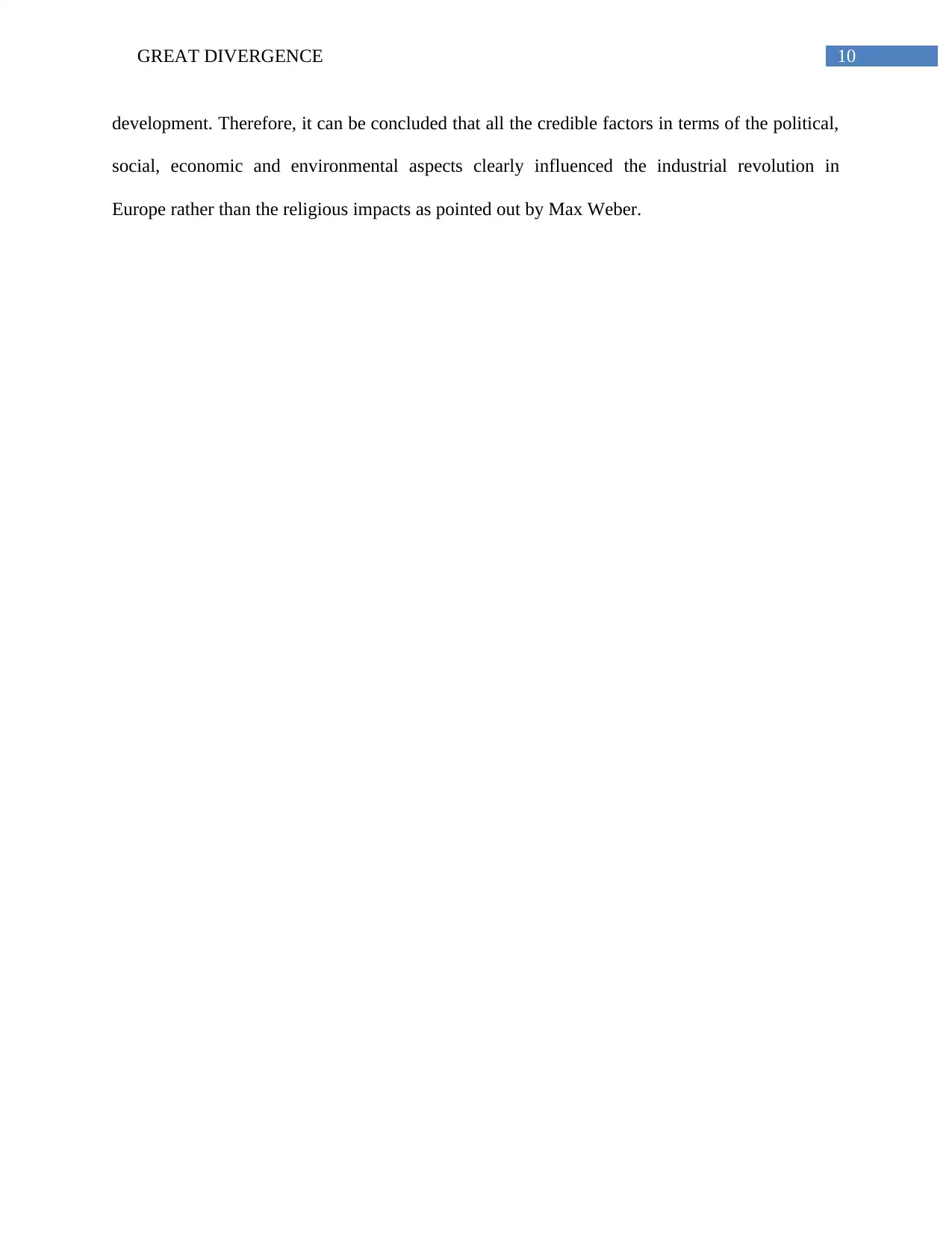
10GREAT DIVERGENCE
development. Therefore, it can be concluded that all the credible factors in terms of the political,
social, economic and environmental aspects clearly influenced the industrial revolution in
Europe rather than the religious impacts as pointed out by Max Weber.
development. Therefore, it can be concluded that all the credible factors in terms of the political,
social, economic and environmental aspects clearly influenced the industrial revolution in
Europe rather than the religious impacts as pointed out by Max Weber.
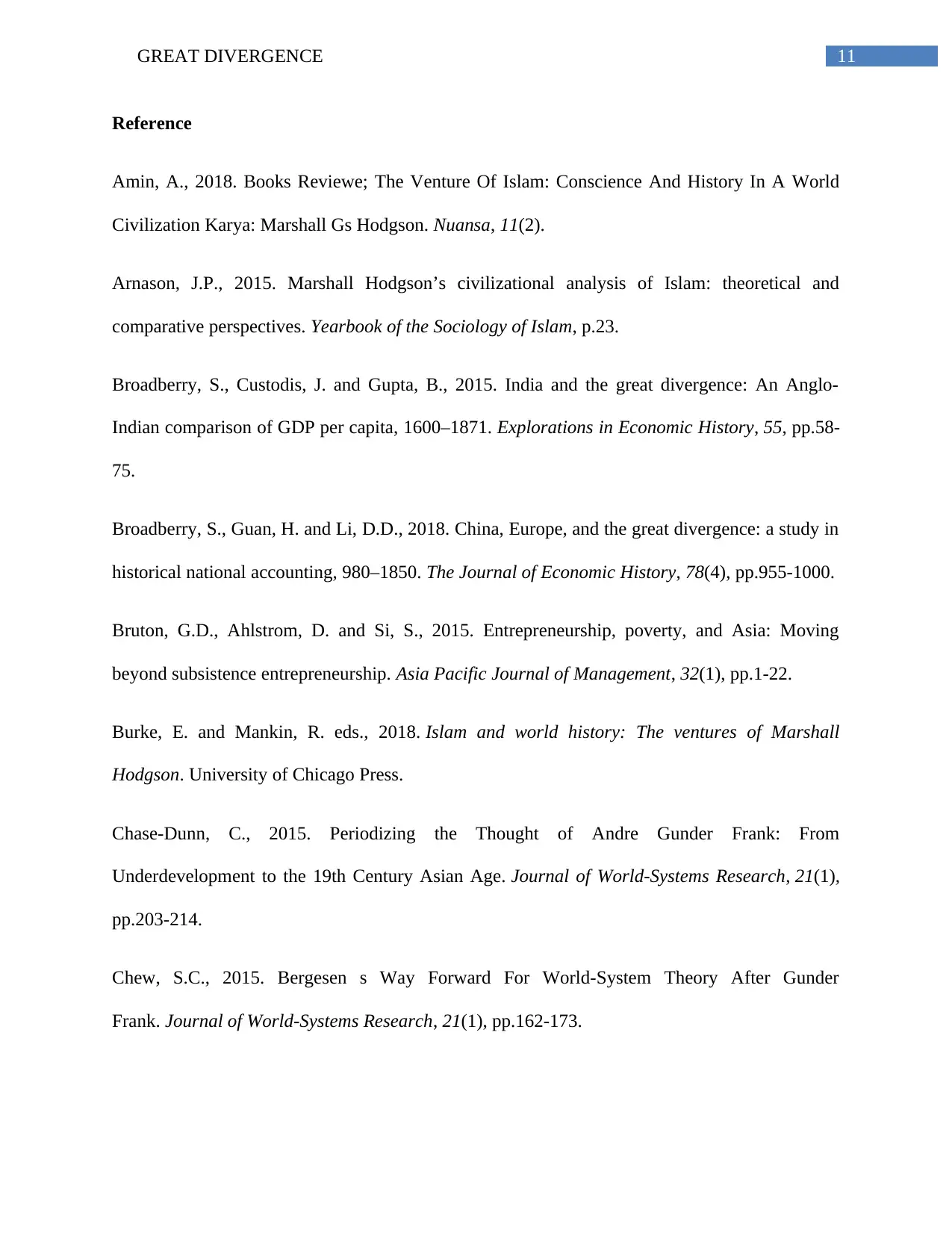
11GREAT DIVERGENCE
Reference
Amin, A., 2018. Books Reviewe; The Venture Of Islam: Conscience And History In A World
Civilization Karya: Marshall Gs Hodgson. Nuansa, 11(2).
Arnason, J.P., 2015. Marshall Hodgson’s civilizational analysis of Islam: theoretical and
comparative perspectives. Yearbook of the Sociology of Islam, p.23.
Broadberry, S., Custodis, J. and Gupta, B., 2015. India and the great divergence: An Anglo-
Indian comparison of GDP per capita, 1600–1871. Explorations in Economic History, 55, pp.58-
75.
Broadberry, S., Guan, H. and Li, D.D., 2018. China, Europe, and the great divergence: a study in
historical national accounting, 980–1850. The Journal of Economic History, 78(4), pp.955-1000.
Bruton, G.D., Ahlstrom, D. and Si, S., 2015. Entrepreneurship, poverty, and Asia: Moving
beyond subsistence entrepreneurship. Asia Pacific Journal of Management, 32(1), pp.1-22.
Burke, E. and Mankin, R. eds., 2018. Islam and world history: The ventures of Marshall
Hodgson. University of Chicago Press.
Chase-Dunn, C., 2015. Periodizing the Thought of Andre Gunder Frank: From
Underdevelopment to the 19th Century Asian Age. Journal of World-Systems Research, 21(1),
pp.203-214.
Chew, S.C., 2015. Bergesen s Way Forward For World-System Theory After Gunder
Frank. Journal of World-Systems Research, 21(1), pp.162-173.
Reference
Amin, A., 2018. Books Reviewe; The Venture Of Islam: Conscience And History In A World
Civilization Karya: Marshall Gs Hodgson. Nuansa, 11(2).
Arnason, J.P., 2015. Marshall Hodgson’s civilizational analysis of Islam: theoretical and
comparative perspectives. Yearbook of the Sociology of Islam, p.23.
Broadberry, S., Custodis, J. and Gupta, B., 2015. India and the great divergence: An Anglo-
Indian comparison of GDP per capita, 1600–1871. Explorations in Economic History, 55, pp.58-
75.
Broadberry, S., Guan, H. and Li, D.D., 2018. China, Europe, and the great divergence: a study in
historical national accounting, 980–1850. The Journal of Economic History, 78(4), pp.955-1000.
Bruton, G.D., Ahlstrom, D. and Si, S., 2015. Entrepreneurship, poverty, and Asia: Moving
beyond subsistence entrepreneurship. Asia Pacific Journal of Management, 32(1), pp.1-22.
Burke, E. and Mankin, R. eds., 2018. Islam and world history: The ventures of Marshall
Hodgson. University of Chicago Press.
Chase-Dunn, C., 2015. Periodizing the Thought of Andre Gunder Frank: From
Underdevelopment to the 19th Century Asian Age. Journal of World-Systems Research, 21(1),
pp.203-214.
Chew, S.C., 2015. Bergesen s Way Forward For World-System Theory After Gunder
Frank. Journal of World-Systems Research, 21(1), pp.162-173.
⊘ This is a preview!⊘
Do you want full access?
Subscribe today to unlock all pages.

Trusted by 1+ million students worldwide
1 out of 14
Your All-in-One AI-Powered Toolkit for Academic Success.
+13062052269
info@desklib.com
Available 24*7 on WhatsApp / Email
![[object Object]](/_next/static/media/star-bottom.7253800d.svg)
Unlock your academic potential
Copyright © 2020–2026 A2Z Services. All Rights Reserved. Developed and managed by ZUCOL.


